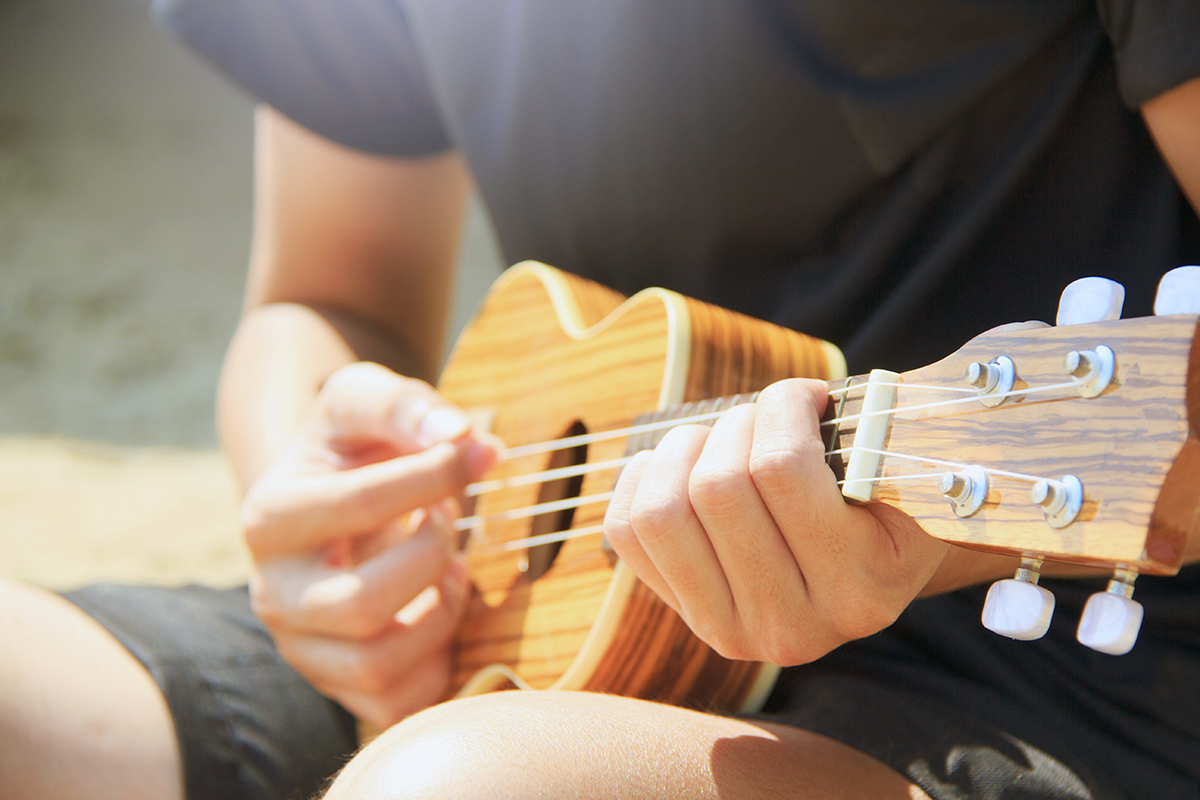
When it comes to improving at any instrument, the key is to practice. If you are not putting the proper time into your instrument, you will not improve. In addition to scheduling proper practice time, there are a variety of things you can do to improve at the ukulele. From trimming your fingernails to recording yourself, here are some tips to improve at the ukulele.
Tuning
Do you ever stop playing because you think your ukulele sounds off? Playing out of tune can be a frustrating experience, especially when you are trying to learn new songs. Learning the chords to a song while your ukulele is out of tune can get you stuck. Ensuring your instrument is in tune is one of the best ways to improve its sound. The standard tuning for a ukulele is CGEA. When you first start lessons, ask your teacher about how to tune your instrument. If you are not taking lessons or want to get a head start, there are plenty of tutorials and videos available online. Keeping your ukulele in tune is especially important if you are playing with others. There are a couple of ways to do this. If you are familiar enough with how the notes should sound, you can use your ears. If not, an electric tuner or an online ukulele tuner will also work.
Maintain Good Form
When you learn a new instrument, it is important that you hold it correctly. This is especially important at the beginning before bad habits have a chance to form. An uncomfortable position will not only hinder learning, but poor posture can also strain different parts of your body, which can lead to injury. You want to have fun while playing your instrument, so it is important to avoid unnecessary strain. When you sit down to play, make sure to sit upright. Hold the ukulele right below your chest and use your forearm to hold the body of the ukulele in place. The hand you use to hold down chords on the fretboard is the final support for the positioning of your uke.
Keep Your Fingernails Trimmed
Something as simple as the length of your nails can have a big impact on the sound of your instrument. Your fretting hands’ fingernails should be kept short. This allows for clean fretting and a more distinct sound. On the flip side, your strumming fingernails can be grown a little longer to help produce a great sound. You may want to grow your nails on the thumb, first, middle, and ring fingers a little longer than the rest. It may be weird at first to have different fingernail lengths, but it is worth it for improved playing.
Record Yourself
It may be a little awkward, but recording yourself can really help your playing. The quality of the recording doesn’t have to be super high quality, you just need to listen to yourself play. There are many ways to make free audio recordings. Voice recorder apps are widely available on most smartphones. Record yourself playing a song and wait a week to listen back to it. You’ll notice any areas that need improvement. When you make a new recording, don’t delete the old ones. Holding onto them will make it easier to see all the progress you’ve made.
Like with audio recordings, you can learn a lot from watching yourself playing and singing. It is reported that Tina Turner and Usher watch their tapes immediately after every performance. You don’t have to reach this level of perfection if you are playing for fun, but it is good to watch yourself after you’ve played. With video records, you can easily see where you need to work on your posture and see how you read as a performer.
Know When to Stop Practicing
We know we have said how important practicing is, but it is also important to know when to stop practicing. You may be tempted to push through the pain in your hands, but if the pain is internal, you can do some serious damage. If your hands feel sore or if you are experiencing cramps or shooting pains in your hands or arms, put down the uke and take a break. If the pain persists even after a few days of not playing, visit your doctor. The pain could be more serious than a simple strain or muscle ache.
Start Singing
One of the most enjoyable things to do when playing a ukulele is to sing your favorite songs. If you find singing and playing at the same time to be challenging, then start off slow. Try humming while playing and using a metronome to pace yourself. Start with the basic down-down pattern. When you got it down, break the song into sections and practice while humming the lyrics. As you get more comfortable strumming and humming, you can start incorporating the words into your playing.
Get Lessons
The best way to get better at any instrument is to get lessons! While there are many ways to learn to play the ukulele (a book, YouTube, friends), it is always better to learn from an experienced teacher. When you book lessons with a teacher, you get their years of experience along with tips and guidance. At Performing Arts, we offer exclusive 1-on-1 lessons with our qualified instructors who will create a structured & individualized age-appropriate curriculum just for you!


